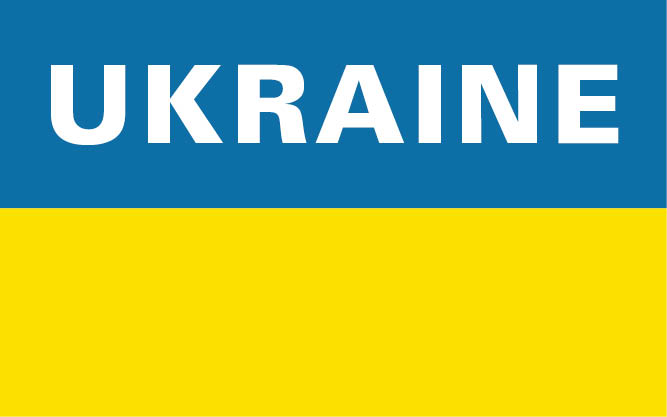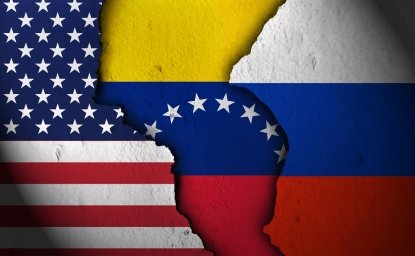- Part of The Russia File
- Podcast
Ukraine on the Second Anniversary of the Russian Invasion

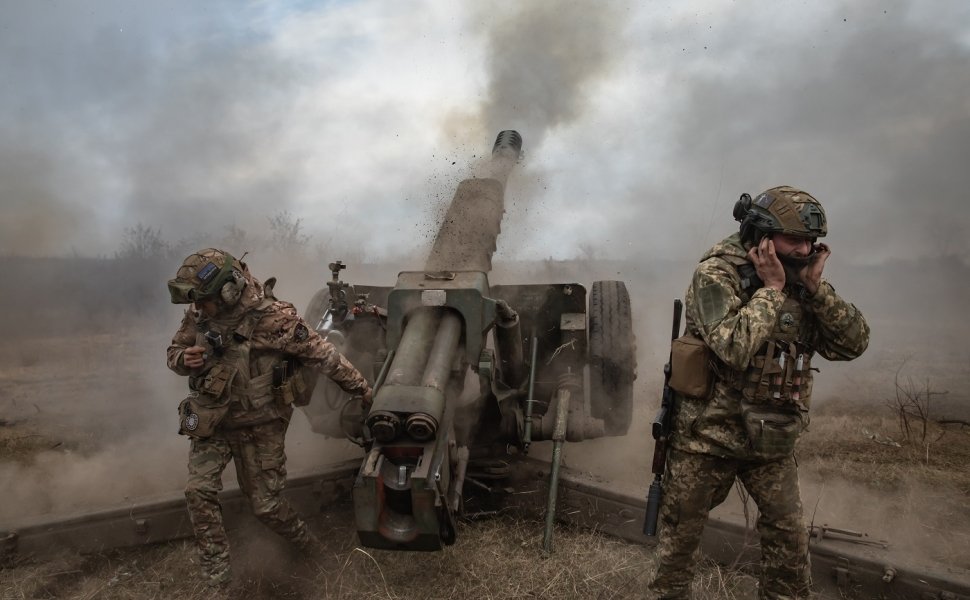
Two years after Russia launched its invasion of Ukraine, Izabella Tabarovsky sat down with Mykhailo Minakov, the Kennan Institute’s senior advisor on Ukraine and editor in chief of its Focus Ukraine blog, to discuss where Ukraine is today militarily, politically, socially and economically; Ukrainians’ sources of resilience; and why bipartisan support for Ukraine is in the national interest of the United States. This is part 1 of our conversation about the second anniversary of the invasion. It was recorded on February 6.
Show notes:
-
From “the Ukraine” to Ukraine: A Contemporary History, 1991-2021, edited by Mykhailo Minakov, Georgiy Kasianov, Matthew Rojansky (ibidem-Verlag, 2021).
-
“Ukraine’s Demography in the Second Year of the Full-Fledged War,” by Ella Libanova, Focus Ukraine, June 27, 2024.
-
“Wartime Ukraine’s Election Dilemma,” by Elena Davlikanova, Focus Ukraine, February 1, 2024.
Time Stamps:
02:26—Sources of Ukraine’s military resilience.
07:35—Morale in the Ukrainian army and Ukrainian society.
12:08—Dispute between President Zelensky and Valerii Zaluzhnyi.
13:28—Ukraine’s political resilience and the problem of wartime elections.
21:25—Ukraine’s shifting demographic map.
26:22—Social unity and cleavages in Ukraine.
29:46—Ukrainian economy.
35:09—Why the US should continue supporting Ukraine.
Episode Transcript
-
Ukraine on the Second Anniversary of the Russian Invasion
Izabella Tabarovsky: From the Kennan Institute, I am Izabella Tabarovsky, and you are listening to The Russia File. Today, we're talking about the second anniversary of Russia's invasion of Ukraine. This is part one of our conversation. In this episode we will be speaking to Dr. Mykhailo, or Misha, Minakov. We’ll be talking about the situation in Ukraine and where Ukraine finds itself at the second anniversary of this terrible war. Misha Minakov is a senior associate with the Kennan Institute. He heads our Ukraine program. He's also the editor in chief of the Kennan Institute's Focus Ukraine blog. Misha, welcome to the program
Misha Minakov: Thank you for having me.
IT: Misha, I want to start by asking you, how are you on this second anniversary? What are you thinking? What are you feeling? Could you even have imagined two years ago that we would be having this conversation two years later?
MM: Well, no, of course not. So, like many other experts, I was sure that this arm wrestling that Putin was doing on the border with Ukraine is just another way of [exerting] political pressure; however, that he was not intelligent enough to start this war and criminal enough to start this war and the terrible annihilation of Ukraine as it was before that war.
But this kind of anniversary is a good reason to kind of turn back, look retrospectively, assess what was happening—my own ideas, the situation on the ground, and the path of Ukraine. Right before the war in 2021, you remember the Kennan Institute and a number of Ukrainian and Western scholars together wrote a history of Ukraine, of independent Ukraine, [marking] 30 years of independence. And I was rereading it recently and I see how some intrinsic optimism was part of this project. So that, despite the ongoing Donbas war already then, many challenges—economic, social, security—everything was there, but still the way authors were looking at Ukraine was optimistic, open-ended; the future was rather bright than dark. And now, I think were we to write this book, it would totally be dedicated to how everything was going toward this terrible war.
IT: I think one thing that of course, everybody has faced and has seen—some with surprise and some with a sense of, “well, we would have expected this”—is the remarkable resilience that Ukraine has shown over this past two years. I really don't think that there were people who would have expected that Ukraine would even withstand the initial assault, let alone be able to stand this long. And so I want us to talk today about the sources of this resilience. We talked a little bit about it the other day, about the various elements of this resilience. So let's talk first about the most obvious, perhaps, part of it, military resilience. Where is Ukraine now militarily at this moment?
MM: Well, probably one big difference is that…in 2014–2015, I was doing a series of interviews with Ukrainian military on the front lines in the Donbas, and quite often Ukrainian [soldiers] were repeating this phrase: “You guys in Kyiv, you made the Maidan, and we now have to [fight] this war.” And it was a sort of disrespect toward political activists from Kyiv. In 2022, since 2022, this kind of division—there was none. I would say that partially this military dimension of Ukrainian resilience is connected [to the fact] that the army has changed since 2014 tremendously. It became much more modernized, it's much more connected to Ukrainian society, and it's very much connected with Western security structures.
So I would say that this is the biggest difference, in ten years and also in two years. In 2022, you also see how security institutions of Ukraine were in shock, and how for a certain period, up until probably April-May, the Ukrainian government, the commander-in-chief, chief generals, they were looking for ways to reorganize resistance and to link Ukraine with all these additional sources of resilience. And it was done successfully. So whatever happens with Commander Zaluzhnyi—and today we see that the presidential office has started an audit of the army, and there are conversations, talks, widely published in the press, about his firing—but Commander Zaluzhnyi and his team of generals definitely made a difference, and huge progress for the Ukrainian army. [Note: Zelensky fired Zaluzhnyi on February 8]
There's another part of this success: partnership with the West. So far, it's still a partnership. It's not an alliance. Yes, in Ukraine, politicians, citizenry, generals, rank and file soldiers—everyone wants that alliance, to be allies with the West. It's not yet there. However, there was an idea of Prime Minister Rishi Sunak about sending the first [Joint] Expeditionary Force to Ukraine from NATO countries or the UK (it wasn't clear from his statement). But even two years after, we can say that there are links, there are very much advanced ties between the general staff of Ukraine and the United States, with the Pentagon, and also with Brussels, with the NATO headquarters.
This kind of partnership has also provided the Ukrainian army with something that allowed [it], first of all, to [reconquer] over 50 percent of the territories that were initially occupied by the Russian forces. And also now, when there's a new phase, when Ukrainian initiative is limited and Russian forces are having more prevalence in this initiative, the front line is very stable. And yes, if we look from this front line, it's stabilized approximately as of October 2023. It's not changing except for some parts, like Avdiivka or Marinka. Russia is piling its resources in several directions—in the Kharkiv Oblast and also in the Kherson Oblast. But even there, where you can see the double prevalence of Russian forces or resources, the front line is quite stable.
Right now, Ukraine has moved to the creation of a strategic defense line. There will be [some] three layers of this line. The priority is, of course, the Donbas and the Zaporizhzhia Oblast. But you can also see that there's construction works going on on the border with Russia and with Belarus in other parts. So basically, we have a very long fortification works right now, and it will be continued this year in order to ensure that any attempt by Russian forces to attack Ukraine would not have success.
IT: You mentioned, as you were talking—you were actually comparing where the Ukrainian army is today—not two years later, but ten years later, going back to 2014. And I think it's a really important comparison. I remember I was in Kiev in 2015, and the thing that was so extraordinary about that moment is the unpreparedness of the army and the incredible effort that civil society put into supplying the army, giving it everything it wanted. I remember a conversation with a professor in Kyiv, someone that you know really well (I'm not going to mention him), but we were having a coffee in Kyiv, and he's a very mild-mannered man, an academic. And all of a sudden he tells me, “well, you know, I have to go, because we bought some equipment, raised money abroad, bought some equipment. I have to go take it to the front.” And I remember sitting there looking at him just completely incredulous—“What? You're going to drive something to the front?” And he said, “yeah, just don't tell my wife. I try not to worry her.” So the mobilization of civil society was just really incredible.
Today, the Ukrainian army is in a completely different place. I think even by February of 2022 it was already in a different place. And some people two years ago were surprised that Ukraine put up so much resistance. I was not surprised at all, because I always knew that Ukrainians would resist. But I want to ask you: how’s the level of morale in the army and perhaps in the broader society? We'll talk more about the broader society later, but in the army, two years later, are people as determined to fight? What is your sense?
MM: Well, of course, the morale was higher in the summer of last year, when there was a counter-offensive and the Ukrainian army aspired to free southern Ukrainian territories. It did not succeed. And of course, if the army does not…achieve certain goals, it does not have the highest level of morale. But there is also no backslide of morale. You definitely see this resistance or resilience in Avdiivka, as heroic action. And this heroism is there every day, every night, every minute.
And this connection of the army and local communities and of the Ukrainian society is huge. I talk to my mom, who lives in a village not far from Zaporizhzhia, and she was telling [me] how she and her friends—older ladies, retired—gather different materials to assist soldiers. A soldier from this village who came for several days on rotation to have rest at his parents’ house—he collected all these things, and they were so heavy that he couldn't even lift them, [and he’s] a strong man. He was hugely grateful to these ladies, to the community. And of course, this kind of thing shows that every visit, every link, every contact returns energy for Ukrainian forces to resist.
There's also definitely this complication that we have right now between the generals and civil government. It also could be not only a problem, but also a solution. The war issues: there's a need to review the plans for the future of the Ukrainian army. And this dispute that’s going on right now [between Zelensky and Zaluzhnyi], it remains civil. It remains limited to strategic issues. And I hope as a result, whether there will be changes or not, the Ukrainian army will come out of it with some additional force. That's also important.
And finally, I would say that the morale in the Ukrainian army and those circles around it—volunteer organizations that are in the shadow between civil society and the army itself, that bring a lot of additional resources to the army, that make sure that soldiers are warm and fed, that they receive additional supplies of drones and so on—it's there. And I definitely see that in local communities in the left-bank Ukraine, in Southern Ukraine, in government-controlled territories, there is no tiredness. I see that in the press there's a discussion: “oh, there's fatigue [in] society, of Western partners.” I can't speak for Western partners, but I can say that in local communities that support the Ukrainian army in the left-bank, in the south, there's no fatigue.
IT: Are you worried at all? You mentioned this and, you know, of course, we're recording at a time when the rift between Zelensky and the commander in chief Valerii Zaluzhnyi is coming to a head; are you worried about this rift? Because Zaluzhnyi has been a very popular figure. So what are you making of this?
MM: Well, Zaluzhnyi is a popular leader and a decent man and a very important figure in this resistance of the first years of the war. Of course, the dispute between the commander in chief and president and commander Zaluzhnyi has its risks, but it also shows that civil government and politicians control the army, that Ukraine remains a democracy. Yes, it's an imperfect democracy. Yes, it's democracy at war, but it remains structurally democratic, and there's citizens’ oversight, the civic elected government oversight over the army, and the generals accept it, which also shows how important this solidarity is. Unlike in many other countries of the world—in the Near East, in the Middle East and North Africa—you see how armies and generals are a specific caste, and they organize politics around them. In Ukraine, it's not the case. In this particular dispute, whichever outcome that will be, it shows that Ukraine remains structurally democratic.
IT: This is a perfect segue to the next topic that we have on our agenda, as we discuss Ukraine's resilience. The other important factor, a crucial factor, is political resilience and, of course, Ukraine being a democracy is what distinguishes it from Russia and makes it such a crucial and valuable ally for the West. But questions are now being raised about the legitimacy of the current leadership. There's a notion that the legitimacy is exhausting itself. Do you agree with that?
MM: Well, of course, there are formal limits to the legitimacy of government—elected government, elected president, elected parliament, and constitutionally, it's for five years. However, the Ukrainian constitution has an article that prohibits elections during war (parliamentary elections), which ensures that the Ukrainian parliament, even though its formal legitimacy expires in August this year, will remain legitimate internally. And, of course, externally, Western partners understand to support this institution and this part of Ukrainian government.
More issues are connected with the legitimacy of the president. The constitution keeps silent on elections during war here. But we can also use the spirit of the constitution prohibiting elections during difficult times of war. Maybe [the legitimacy] can be extended. Otherwise, there's also a solution in the form of a government or a cabinet of national unity. If there is a case and there's visible damage to this exhausting presidential mandate, which is due May 24, then there are solutions to this as well.
And, of course, Ukraine, during this war, is changing so much that there will probably be a new constitutional process, a new assembly, in the future, that will reconstruct Ukraine. And the way we deal with these issues in Ukraine, they also prepare a future return to civil democracy in Ukraine. However, it's important to see that the president and the parliament are in discussion. It shows that there are differences in opinions, but there's a process of negotiations, internal political competition is in place, and it's limited by the needs of solidarity, but also it preserves the structure of living democracy.
That said, we should also remember about the risk—that if we look at the context of Eastern Europe, right now we have election issues with Russia and Belarus. This year, in March, we have elections of Putin, and it's clear what kind of an electoral process it is. That's more an institution of post-Soviet autocracy that should demonstrate to its population, but also to its allies and its rivals, that Putin and his clique are in control of politics, the economy, and society. And this is planned to be demonstrated.
There's also another process, an electoral process, in Belarus, where the first Eastern European dictator Lukashenko is aged. He prepares his retirement. There's a new legislative act approved last year, where all the guarantees for Lukashenko are prescribed even after his resignation. But it looks like he's going to be the incumbent as well. So we should pay attention to what will happen there as well.
Anyway, these autocracies in Eastern Europe—they are preparing their electoral mandate. And one of the challenges for Ukraine definitely [lies] here. Ukrainian democracy continues to be at war with two autocracies. However, these autocracies have elected leaders—of course, falsely elected—but for many countries in the Global South, in northern Eurasia, it's very important. And for Kyiv, there is a need to think smartly and prospectively also in regional competition, also at this level.
IT: In other words, to be able to say that, to prove that we have the ongoing legitimacy and the ongoing mandate to continue with the war. But there are, of course, risks in an election at wartime. And Ukraine is not the only one that faces this risk. There are questions about elections in Israel as well. [18:04] What are the risks of conducting elections at wartime? They're pretty significant.
MM: Absolutely, especially with a war of this kind, as we have in Ukraine. So basically, [18:14] you have a quarter of voters who fled abroad. Another important 10 percent to 15 percent of the population are IDPs—internally displaced people—who live in new places, new communities, and they have issues with access to possible electoral poll stations. So in a way, even the voting—even though the electoral process is longer, bigger—but even the voting itself is close to impossible. There [are] ideas [about] how to organize it electronically online, or to organize it some other way, but it would not create additional—well, it would not create the necessary trust for the results of the elections.
So why would we need elections? A couple of weeks ago, I was in DC and this issue was brought up [constantly] by American experts, American politicians, and bureaucrats. And the question is, why would we need these elections? And the answer is that the government needs to have full recognition, a democratic mandate, and democratic legitimacy. Agreed. But if we organize elections in this hugely de-structured, destroyed society, where many social groups would not be able to participate in elections, and during the war and hits against the rear and frontline areas, you cannot even vote there. This means that we would have elections that would not produce the outcome of democratic legitimacy for the government.
Ukrainian society has a record of being sensitive to the honesty of electoral results. In 2004, there was an electoral revolution. In 2019, there was an electoral revolution again—well, honest elections (there was no mass protest movement), but elections are important. And here we definitely see the risk. If we conduct elections in these conditions, and society does not trust [the results], it would just add a challenge to government and the political order in times of war and attrition.
IT: Well, that’s a really important point. And we just published an article recently on Focus Ukraine, which we will include in our show notes, where it says that some 80 percent, according to a recent poll, some 80 percent of Ukrainian voters actually prefer [no] elections now—to postpone them till the end of the war, for fear that that it will interfere with the war effort.
MM: Exactly. Elena Davlikanova, the author of this article, but also many other experts from Ukraine, and then these wide sectors of the population—they are in agreement. It is reasonable to postpone. Democracy should be a proper process, not only this formal outcome. But again, in order to have strong legitimacy, there are other ways of making sure that the Ukrainian government has democratic support and a democratic mandate to govern further.
IT: Let's talk about what's going on at the social level. Ukrainian society has undergone a massive transformation; you've already mentioned it. Millions of Ukrainians are now in Europe. Some actually are in Russia. What can we say in terms of demography, immigration, and how has that influenced Ukrainian society and its resilience?
MM: Yeah, well, it's just another source of Ukraine's resilience: this society. We were slowly adapting. We were learning to how to live under the conditions of war since 2014. It was a slow process. It was a learning curve that showed in 2022 that society still can survive. Yes, a huge number of Ukrainians, mainly women and children, have left Ukraine. There's also these IDPs, which I mentioned. There are also people who are in the occupied territories.
Today there's a huge debate between different experts: what is the number of the Ukrainian population in the government-controlled territories? Well, in Focus Ukraine, we’ve published already, several times, materials by Ella Libanova, the leading specialist on Ukrainian demography. Right now, we prepare for the Kennan Cable, a special report that she wrote. And this report is based on a project, a draft strategy of Ukrainian demographic development. It's a very sober and realistic analysis of what it is right now. So we have a new human geography in Ukraine. The Ukrainian urban population was concentrated in the southeast, in big industrial cities or postindustrial cities Kharkiv, Donetsk, Luhansk, Dnipropetrovsk, Zaporizhzhia, Odesa, Mykolaiv. These are big cities that organize—also economically and demographically—a very industrial, modernist way of life.
There was also another part of Ukraine around Kyiv. Kyiv is the political administrative center and economically the richest city. And it's an agglomerate also, with the population tending to live around it. And then there was the western and central western Ukrainian territories, with a more rural way of life, smaller cities, but also with their own chic culture…, a high standard of life; and the ecology, of course, was much better than in the southeast.
These three parts are nonexistent today. A huge number of the urban population from the southeast moved to Kyiv and to western Ukraine or abroad. In the front line, in former urban areas, we have mainly soldiers, military structures, and an older population. Then in central Ukraine, where a lot of men were drafted, more and more the economic role of women was growing. I know one agricultural company from central Ukraine that used to have 500 men as a security department there. All [of] this department joined the army in 2022. And right now, the security department has the same number of personnel, but all of them are women, and they provide security for this agricultural company. But if we look at other formerly male professions in this company, they are also taken by women. So, women's role is growing economically.
And society, of course, tries to find its own ways of, first, survival, second, resilience, and third, supporting the army. A part of your daily routine is: “okay, I'll do something for the army, or I will prepare some jams, some pickles, and so on, and it will be sent to the army using volunteers.” Recently, another expert from Ukraine, Larisa Pilgun, [conducted] research based on a huge number, like hundreds of interviews, in 2022 and 2023, with Ukrainian volunteers: What are their motivations? Where do they get resources? How do they combine the minimum of work that they would need to get their wages to continue living and provide for their families, but also to work for the army, to support the army? And it's a very interesting report. I hope you'll also ask Larisa to write for Focus Ukraine…in order just to understand, from within, how Ukrainians [have been] changing during this war and how this change is now institutionalized. So it's a set of rules, a set of practices, that is being repeated, or other people now enter into it.
IT: What is your sense of unity in Ukrainian society?
MM: There are cleavages definitely. After, probably, the first year, society is basically very much motivated just to survive and to resist, [get] successes on the front line, and also normalize life under the war. Also, internal politics have returned, competition between different parties. There are several new cleavages. One of the cleavages that is visible is between those who stayed and those who went abroad. This is seen within companies or within universities. You can see this within communities, smaller communities. That's one type of cleavage. Another cleavage right now is organized around the draft law on mobilization. So that's what also generals and politicians are debating right now.
IT: What are they—what is the debate around? What are the main arguments in that debate?
MM: Well, if we look socially, it's the families—that part of society which consists of families that have sent their members to the front line, so they are in the army. And those families who still avoid mobilization. This kind of social cleavage is in place. But if we look at the parliament, at the political level, the debate is how to properly organize the mobilization, how to make it normal, make it look open for planning, just understand what is the demography in Ukraine, how to invite men and certain professionals who are women into the army, and how to ensure that those who have been already for two years on the front line, they would have an ability to return…home or rotate and have rest and then return to the front line. So these kinds of issues are in place. And of course, the debate at the political and legal levels is how to combine this duty to defend your country with…the obligations of the state to respect human rights. And again, it shows how structurally Ukraine remains a democracy.
IT: And you mentioned the issue between those who left and those who stayed. What are the arguments there?
MM: Well, what kind of a citizen you are if you left: should you remain a professor of that, that university? Or are you still a member of this community? Do you have the right for this plot of land? Do you still have a right to your apartment? What are the rights of those—if we're talking about mobilization, for example—if you're a man and you're hiding from the draft, what is the punishment? Will your bank account be blocked? Will you be punished if you show up to the drafting place? And so on. So this kind of debate is in place and it also questions the spirit of citizenship. Who are the citizens? What are their duties and obligations, what are their rights?
IT: Well, and it's striking to hear about it, because, of course, within Russian society, you can't have a conversation about this. There's just silence, and nobody really even knows what anybody thinks. There is a set of norms that you're supposed to adopt, and that's it. And in Ukraine, there is, as you say, there is a debate about what does it mean to be a citizen? It's such a crucial thing to any democracy. Let's talk about what's going on economically. How is the Ukrainian economy doing at this point?
MM: Well, the first year Ukraine lost approximately one-third of its economy. Now there's a slow return to growth. This year, according to the data of the World Bank and the Ukrainian government. It's between the expected growth, between 3.5 percent to even 4 percent. But of course, after that big loss, it’s an issue.
The Ukrainian economy lives in a difficult period. If you look at the structure of this economy, the big industry is functioning at the minimum of its abilities. Many oligarchic industries, like in Azov (Azovstal) or in Kremenchuk (there was a huge oil refinery), they are partially or totally destroyed. There are big industrial lots like in Kryvyi Rih; [Arcelor]Mittal steel [factory], it still functions, but constantly in a very difficult situation, because every hit on the energy system means that the plant doesn't work for some period.
In this kind of [situation], big business, big industry, disappeared. Oligarchy itself, we see how it loses its economic power, which cannot be anymore converted into political power. And that's a totally new Ukrainian situation. Oligarchs influence, negatively, the competition in Ukraine. Without them, competition will probably return to Ukraine as a market economy.
But there's also an issue for small business, which will now have to pay bigger taxes. It's still in process; the new tax policy is a process, because the Ukrainian government needs to collect more and more resources to sustain the armed forces. Today, in principle, everything Ukraine collects in the Ukrainian economy, on Ukrainian soil, goes for the life of society—especially retired people, the so-called budgetniks—people who depend on the state budget, like hospitals, like schooling. They all depend on Western support. Yes, now, recently, just a few days ago, the Council of Europe, the Council of Ministers of the European Union, approved a new long-term program for supporting Ukraine: direct budget support of €50 billion. And this year, since we are talking to an American audience, at least $13 billion will be given to Ukraine, maybe a bigger portion will be given to Ukraine, to support Ukraine's government in its social policies in some other areas. That's a very important part.
And of course, American support for Ukraine, both military support and financial support, is crucial. According to the estimations of the Ukrainian government, in 2022, every month, Ukraine needed around $3.5 billion to survive and resist in this war—$3.5 billion from outside sources. Right now, for this year, we have approximately half. And of course, this debate on [Capitol] Hill and the delay with American support hits the Ukrainian economy hard.
But even in these conditions, if you look at the two last months, when American and European support was delayed, Ukrainian currency stayed more or less stable. There is inflation, but it’s not Argentina or Turkey, in terms of inflation. So this Ukrainian financial miracle is here and you can see that even in bad-case scenarios, in bad periods, Ukrainian financial resilience, one more dimension of resilience, is in place.
So in a way, the Ukrainian economy right now is connected to agriculture, and the trade with Europe or through Europe is critically important. And this one, this route, is hindered as well. The movement of farmers in Europe, especially in Poland, especially in Romania—in Central European countries—hits hard when there is a blockade. According to the Ukrainian government, the Ukrainian economy lost more than $2 billion last fall because of this blockade, when Ukrainian agricultural products couldn't get to the European market.
Thank God, there is this ongoing cooperation with Romania. Through Romanian ports, Ukrainian agricultural products are being sold globally. But, of course, there is a need to return to normal economic relations with our political and military friends (but economic rivals) in Poland and other countries in Central Europe. I see how many efforts are applied by the European Commission to mediate. But the farmers from Central Europe, they have their own interests. They have their own problems. And politicians so far haven’t found a way to balance Ukrainian interests and their farmers’ interests in these matters.
IT: Misha, I want to ask you, we're recording this just as the next big package of support for Ukraine is being discussed in Congress. And of course, American aid has been crucial for Ukraine to be able to resist and maintain its resilience. What would you say to those lawmakers in the U.S. who are hesitant to pass this support and who are questioning America's support for Ukraine? What would you say to them in order convince them?
MM: It's not even a theoretical question, because I witnessed these kinds of questions and debates just two weeks ago in DC. My answer is that there is a partnership, a long-term strategic partnership, between the US and Ukraine. And this framework, per se, is a value. Ukraine has a value for the United States, and the United States has value for Ukraine, and it's mutual interest to continue cooperation.
It would be hugely important to decouple Ukrainian support from other issues which are very important for the United States, for the American people. Probably it was a mistake to join Ukraine in issue with some others, and maybe it's time to take a step back—to respect the political diversity, to respect differences in American politics, but to return to this bipartisan support of Ukraine, which we saw before September 2023.
What happened? Well, basically, we were in the same position. We are strategic partners. And this partnership should be reinstated. Let's remember that, yes, practical interests, security, and other security challenges that the United States has globally are important. But in the war against Russia in Ukraine is one of the core issues for the United States as well. Just remember what happened in Afghanistan: does America want to return to the same position again?
IT: Crucial question. Misha, thank you so much for joining us.
MM: Thank you, Izabella. And thank you to our audience for listening.
IT: This concludes part one of our conversation, reflecting on the second anniversary of Russia's invasion of Ukraine. I'm Izabella Tabarovsky. Thank you for listening, and we'll look forward to having you with us for the next episode of The Russia File.
The transcript has been lightly edited for clarity.
Guest

Moderator


Kennan Institute
After more than 50 years as a vital part of the Wilson Center legacy, the Kennan Institute has become an independent think tank. You can find the current website for the Kennan Institute at kennaninstitute.org. Please look for future announcements about partnership activities between the Wilson Center and the Kennan Institute at Wilson Center Press Room. The Wilson Center is proud of its historic connection to the Kennan Institute and looks forward to supporting its activities as an independent center of knowledge. The Kennan Institute is committed to improving American understanding of Russia, Ukraine, Central Asia, the South Caucasus, and the surrounding region through research and exchange. Read more

Related Episodes
Browse all episodes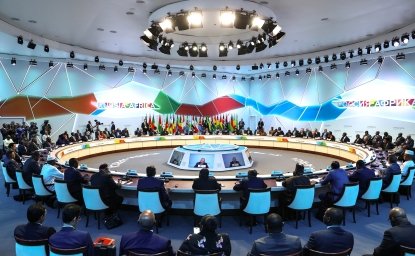
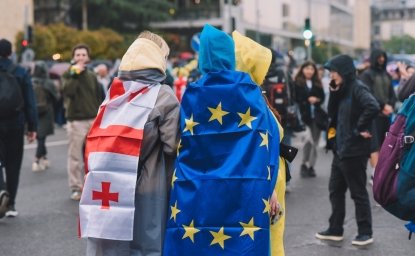
- Governance
Georgian Politics After Controversial “Foreign Agent” Law

